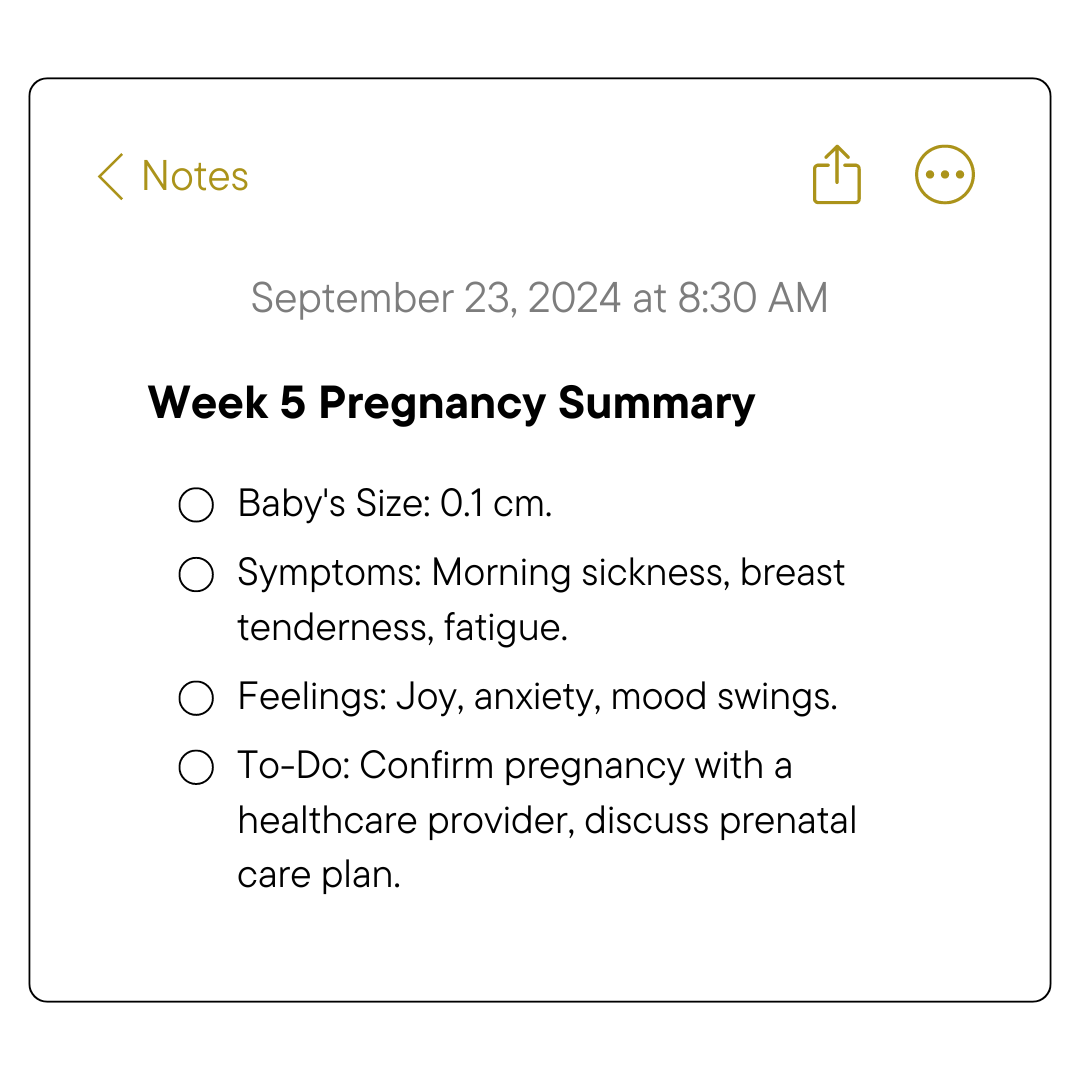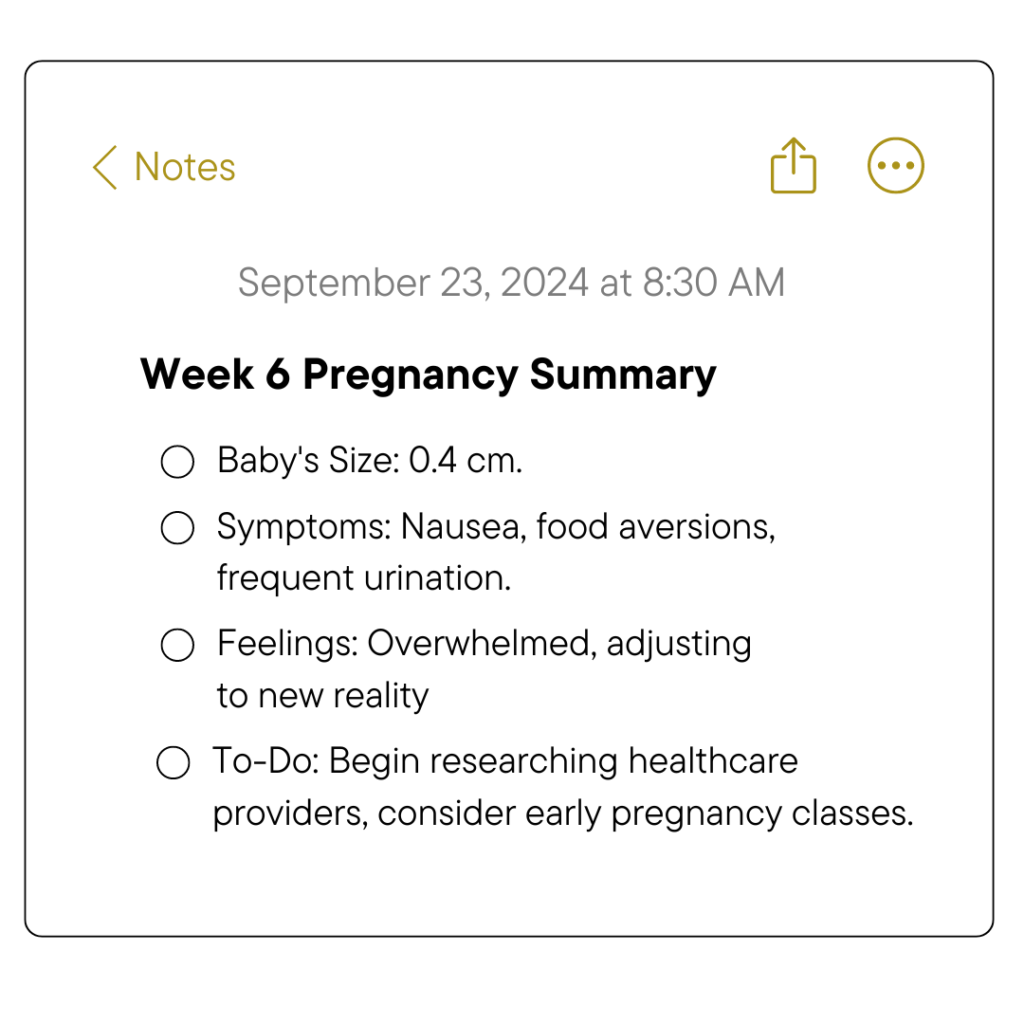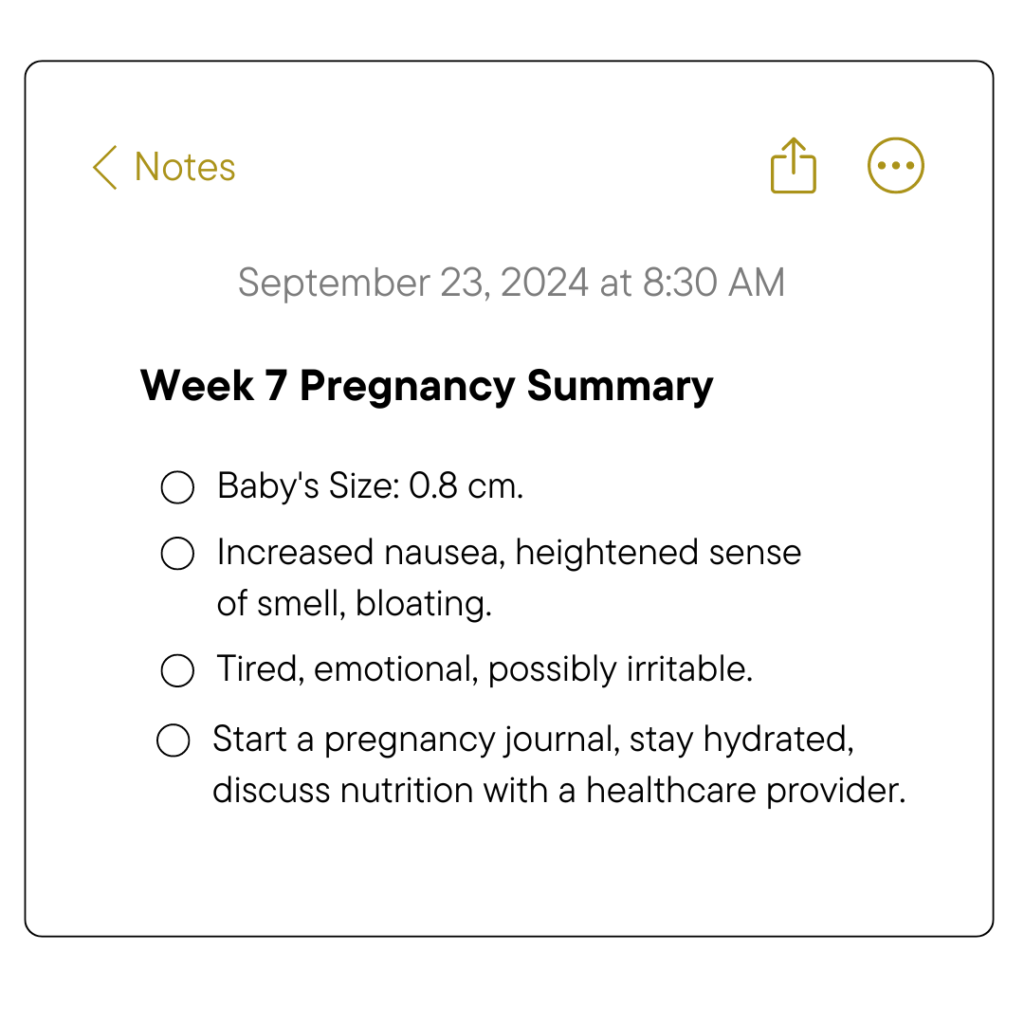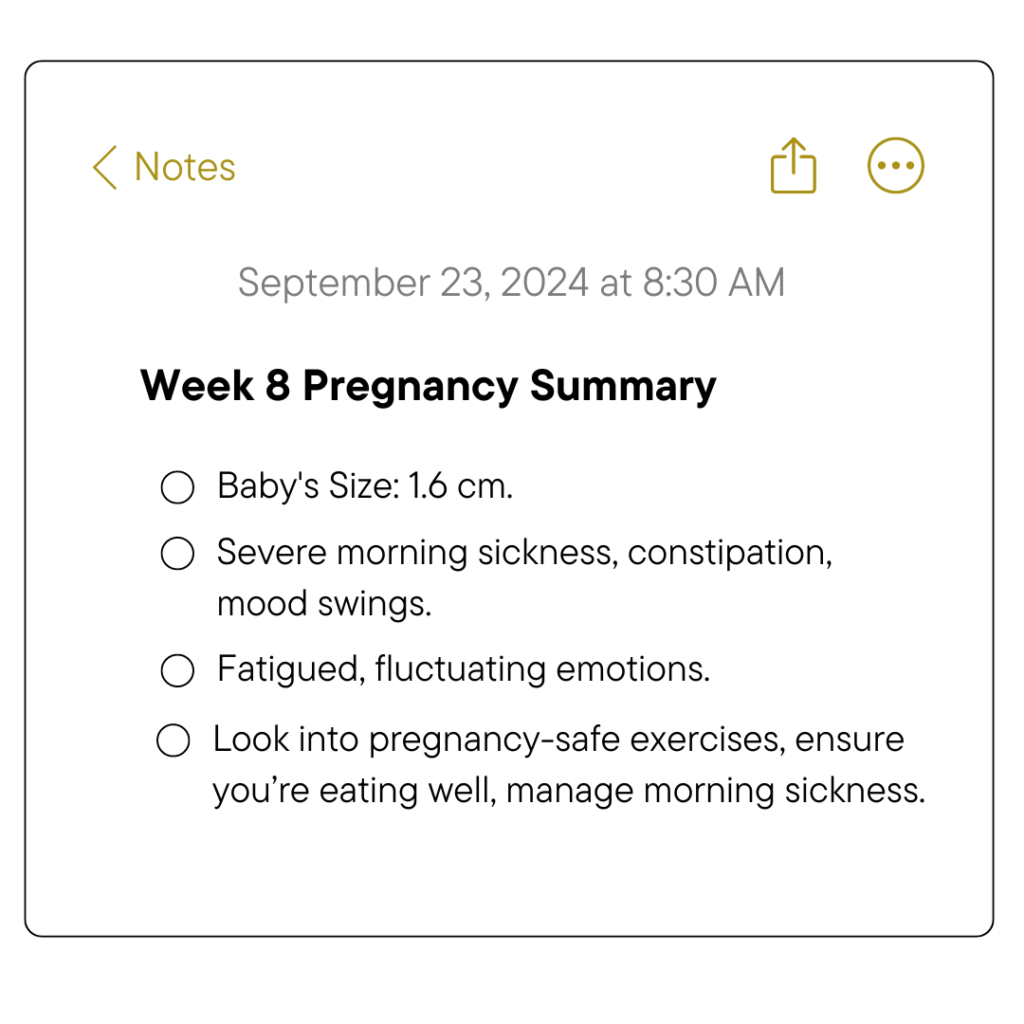Weeks 5-8 of Pregnancy
Week 5 Pregnancy Symptoms
By week five, your baby is still tiny, about the size of a sesame seed, but there’s a lot happening inside. This is the week when many people first start noticing that they’re pregnant, especially if they’ve missed a period. Morning sickness might kick in, and you may feel queasy, tired, or just not quite yourself. Breast tenderness and a stronger sense of smell are also common signs that things are changing. That said, lots of people still won’t notice any changes at all yet, and that’s fine too!

Fatigue is one of the most common symptoms this week, and you might find yourself needing more rest than usual. Your body is working hard, so don’t be surprised if you need an afternoon nap or feel like you’re dragging by the end of the day. Nausea can come and go at any time of day, despite its misleading name—morning sickness can strike in the afternoon or evening too!
Note from the editor: I was working as a teacher during my first pregnancy and would feel extremely unwell in the morning, but fine by the time the kids came into class. After school, as the busy, distracting elements of the day were done, I would start to feel the sickness coming back again. It’s different for everyone but keeping myself busy was a good way to ignore the feeling in the early days.
Emotionally, this week can be a bit overwhelming. You might be feeling excitement, anxiety, or a mix of both as the reality of being pregnant begins to sink in. It’s completely normal to feel a range of emotions, so give yourself some grace if you’re feeling a bit off. Now is a great time to start thinking about self-care routines to help you manage the physical and emotional changes ahead.

If you haven’t already, now’s the perfect time to book an appointment with your GP or midwife to confirm your pregnancy and begin planning your antenatal care. In some areas, you can self-refer to your local NHS antenatal care unit, so check with the GP’s website or receptionist for the latest protocols. Keep taking your prenatal vitamins, and make sure you’re staying hydrated and eating small, regular meals, especially if nausea is making it hard to eat larger portions.
Week 5 Pregnancy Summary

Week 6 Pregnancy Symptoms
At week six, your baby is growing quickly, now around the size of a lentil, and their heart is starting to beat! You might not feel anything yet, but things are developing rapidly inside. Morning sickness could be making an appearance, and you might feel quite tired as your body adjusts to the changes. More frequent trips to the loo could also become a regular part of your day, which can be unexpected for some – afterall the baby isn’t big enough to be pressing on your bladder yet!

If you’re feeling constantly nauseous, try sticking to small, frequent meals throughout the day. Keeping some dry crackers or plain crisps or biscuits on hand can help settle your stomach when it’s feeling unsettled. You might also find that certain smells trigger nausea more than before, which is all part of your heightened senses in pregnancy. Stay well-hydrated and listen to your body—it’s okay to take things slow.

Another pregnancy symptom that seems to go unheard is increased gum sensitivity. If you’re finding that your gums bleed when brushing, this could be a normal early pregnancy symptom. That said, dental care is free in pregnancy so do get a check up if you’re worried about any oral symptoms.
This week might bring a mix of emotions. You might feel joy and excitement one minute, and then anxiety or complete overwhelm the next. Don’t worry—these emotional ups and downs are completely normal and often driven by the surge of hormones in your body which is growing stronger now. Be kind to yourself and allow room for all the feelings that come with this exciting, yet sometimes confusing, time. Confide in those closest to you who know about the pregnancy.

One practical task this week is to continue eating as healthily as you can. If you’re finding it difficult to keep down certain foods, focus on getting essential nutrients from whatever you can manage. If you haven’t done so already, it’s a good time to start thinking about the healthcare professionals you want to support you throughout your pregnancy.
Week 6 Pregnancy Summary

Week 7 Pregnancy Symptoms
By week seven, your baby has grown to the size of a blueberry, and although still tiny, they’re already developing little arm and leg buds! You might feel like things are really starting to ramp up in terms of symptoms, with morning sickness, tiredness, and maybe even mood swings in full force. Your clothes might be feeling a little tighter as bloating becomes more noticeable, especially for second and subsequent babies.

Nausea can still be quite intense this week, and you might find it helpful to experiment with different foods to see what sits best with your stomach. Some find ginger helpful for settling nausea, while others rely on salty crackers or small, frequent meals. It’s important to keep hydrated, so keep a water bottle handy throughout the day.
You might feel more emotional this week as hormone levels continue to rise. Whether it’s crying at a TV advert or feeling more irritable than usual, these mood swings are completely normal. Try to rest when you can and allow yourself some grace during these rollercoaster moments. It might help to share how you’re feeling with a close friend or your partner.

If you haven’t already, this week is a good time to book your first antenatal appointment, also known as your ‘booking appointment’. This appointment usually takes place around 8-10 weeks, but it’s good to get it on the calendar now. During this time, your midwife will ask about your medical history, offer advice, and discuss the next steps in your pregnancy care.
Week 7 Pregnancy Summary

Week 8 Pregnancy Symptoms
At eight weeks, your baby is about the size of a raspberry and continuing to develop rapidly. You may notice that your waistline is starting to expand as your uterus grows, and those jeans might be feeling a bit snug! Morning sickness and fatigue may still be hanging around, but remember that these symptoms are usually a sign that your pregnancy is progressing well.

Bloating, gas, and constipation are common this week as your body adjusts to pregnancy hormones. These digestive changes can make you feel uncomfortable, so it might help to eat smaller meals more frequently and avoid foods that make you feel bloated. You may also start to experience food aversions, where things you used to love now seem completely unappetising—don’t worry, this is perfectly normal. It can also happen with smells, where even a whiff of cooked onions or petrol at the forecourt could make you want to throw up!
Emotionally, you might still be finding things overwhelming. You’re approaching the end of the second month, and things are starting to feel more real. It’s common to feel a bit anxious, especially if you’re dealing with a lot of physical symptoms. Try to take it one day at a time and focus on self-care. Whether it’s taking a relaxing bath, going for a gentle walk, or simply having a nap, make sure you’re looking after yourself.

If you haven’t already, it’s a good idea to start a pregnancy journal to track how you’re feeling and document your journey. It’s also a good time to look into pregnancy-safe exercises, like gentle yoga or walking, to help keep you active and support your mental health. If nausea is making it hard to eat, talk to your midwife for advice on staying nourished.
Week 8 Pregnancy Summary

Read more from Pregnancy Pal
-
Is It Normal to Feel Exhausted in Early Pregnancy?
Exhaustion in early pregnancy can feel overwhelming. Many people are surprised by how intense fatigue can be, particularly in the first trimester. Feeling extremely tired in early pregnancy is common and usually linked to hormonal changes. Early pregnancy exhaustion is not the gentle sort of “I stayed up too late watching telly” tired. It is…
-
Pregnancy Bra Fitting Guide: How to Get the Perfect Fit
If someone had told me that getting fitted for a bra would be one of the most helpful things in pregnancy, I might have blinked slowly and nodded while scrolling Instagram. But let’s be honest, when your body is doing the most dramatic redesign since puberty, a bra fitting in pregnancy moves from “optional” to…
-
Why Do My Breasts Hurt in Early Pregnancy?
Breast tenderness is often one of the earliest signs of pregnancy. For some people it is mild discomfort or an unusual tingling sensation around the breast, while for others it can feel surprisingly intense, making everyday movement uncomfortable. When this pain appears early on it can raise questions about what is normal and whether it…



